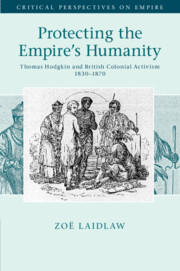Book contents
- Protecting the Empire’s Humanity
- Critical Perspectives on Empire
- Protecting the Empire’s Humanity
- Copyright page
- Dedication
- Contents
- Figures
- Maps
- Acknowledgements
- Abbreviations
- 1 Introduction
- Part I Mapping Humanitarianism
- 2 Indigenous Protection at the Humanitarian Apogee
- 3 Metropolitan Contexts
- 4 Anti-slavery, Colonization, and Emigration
- 5 Free Trade versus Free Labour
- Part II Humanitarianism and Settler Colonialism
- Bibliography
- Index
2 - Indigenous Protection at the Humanitarian Apogee
from Part I - Mapping Humanitarianism
Published online by Cambridge University Press: 14 September 2021
- Protecting the Empire’s Humanity
- Critical Perspectives on Empire
- Protecting the Empire’s Humanity
- Copyright page
- Dedication
- Contents
- Figures
- Maps
- Acknowledgements
- Abbreviations
- 1 Introduction
- Part I Mapping Humanitarianism
- 2 Indigenous Protection at the Humanitarian Apogee
- 3 Metropolitan Contexts
- 4 Anti-slavery, Colonization, and Emigration
- 5 Free Trade versus Free Labour
- Part II Humanitarianism and Settler Colonialism
- Bibliography
- Index
Summary
This chapter explores three connected approaches to the protection of indigenous peoples and their rights in Great Britain’s empire that emerged in the wake of slave emancipation. The House of Commons Select Committee on Aborigines (1835–7) published a report described as a ‘blueprint’ for imperial humanitarians throughout the rest of the century. It inspired the 1837 establishment of two new bodies, each dominated by Dr Thomas Hodgkin, which advocated the protection of indigenous peoples in Britain’s empire: the Society of Friends’ Committee on Aborigines and the better-known Aborigines’ Protection Society. The Friends’ committee endured for twenty-five years, drew on British Quakers’ experience of anti-slavery activism and disbursed a substantial budget, but had a limited impact. The Aborigines’ Protection Society proved better at maintaining and drawing on networks that incorporated government, settlers, indigenous people, missionaries and humanitarian activists.
Keywords
- Type
- Chapter
- Information
- Protecting the Empire's HumanityThomas Hodgkin and British Colonial Activism 1830–1870, pp. 31 - 60Publisher: Cambridge University PressPrint publication year: 2021

